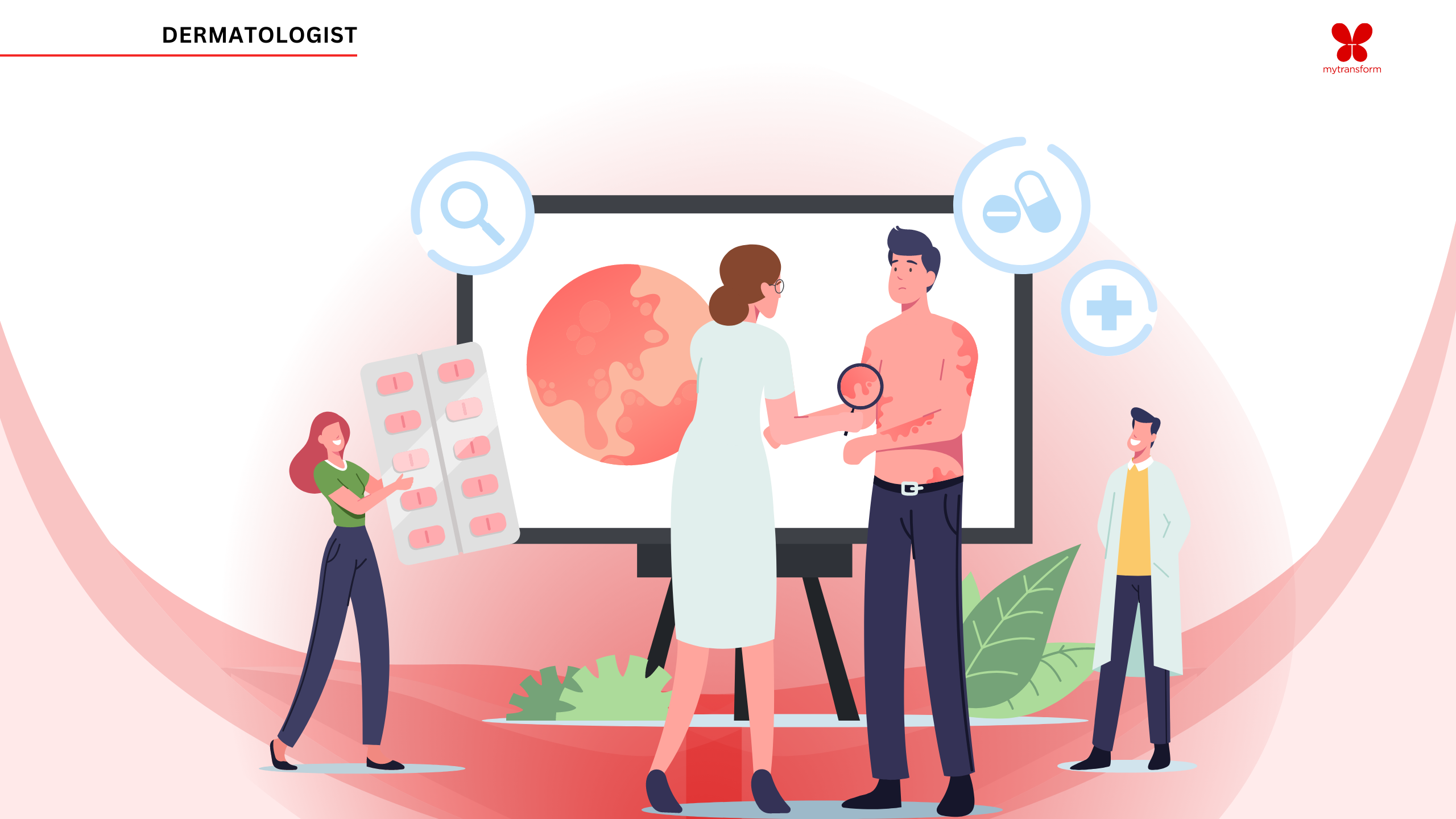
A dermatologist is a doctor who specializes in the diagnosis and treatment of skin diseases. They can help you with a variety of skin problems, from acne to eczema to psoriasis.
They also have a wide range of treatments and products available to them, including skin transplants and laser treatments.
A dermatologist is an important part of your healthcare team, and they can help you improve your skin condition in a variety of ways. If you are wondering “How to become a Dermatologist in India?”, this article will provide all the details on how to be a skin doctor, dermatologist degree, dermatologist course duration, salary, etc.
Who Is A Dermatologist?
A dermatologist is a medical doctor who specializes in the diagnosis and treatment of conditions that affect the skin, hair, and nails.
Dermatologists are trained to evaluate and manage a wide range of skin conditions, including acne, eczema, psoriasis, skin cancers, and more.
They use a variety of diagnostic tools, including physical exams, biopsies, and laboratory tests, to determine the cause of a skin condition and develop a treatment plan.
Dermatologists may use medications, surgery, or other therapies to treat skin conditions, and they often work with patients to develop a skin care plan to help prevent future problems.
Types Of Dermatologist In India
There are several types of dermatologists in India, including:
1. General Dermatologists:
These doctors diagnose and treat a wide range of skin conditions, including acne, eczema, psoriasis, and skin cancers.
2. Pediatric Dermatologists:
These doctors specialize in the diagnosis and treatment of skin conditions in children.
3. Dermatopathologists:
These doctors specialize in the diagnosis of skin conditions through the examination of skin samples under a microscope.
4. Dermatologic Surgeons:
These doctors perform surgeries related to the skin, such as mole removal and skin cancer surgery.
5. Cosmetic Dermatologists:
These doctors specialize in cosmetic procedures, such as laser treatments, Botox injections, and dermal fillers, to improve the appearance of the skin.
6. Dermatologic Oncologists:
These doctors specialize in the diagnosis and treatment of skin cancers.
7. Immune Dermatologists:
Immunodermatologists diagnose and treat skin disorders related to the body’s immune system.
8. Tele Dermatologists:
Tele dermatologists use e-health applications and telemedicine to diagnose and treat patients remotely through the use of telecommunication technologies.
What Does A Dermatologist Do?
Dermatologists specialize in the diagnosis and treatment of conditions that affect the skin, hair, and nails. Some of the specific tasks that a dermatologist might do include:
-
- Examine patients to assess the health of their skin, hair, and nails
-
- Diagnose skin conditions based on physical exams, medical history, and laboratory tests
-
- Prescribe medications to treat skin conditions, such as topical creams or oral medications
-
- Perform surgeries to remove skin growths or treat skin cancers
-
- Provide cosmetic treatments, such as laser treatments, chemical peels, and injectables, to improve the appearance of the skin
-
- Educate patients on how to care for their skin and prevent skin problems
-
- Refer patients to other specialists, as needed.
Eligibility To Become A Dermatologist
If you’re interested in becoming a dermatologist in India, be sure to check out the eligibility requirements and qualifications listed below.
-
- Complete Class XII and qualify for the National Eligibility cum Entrance Test (NEET).
- Complete a 4.5-year bachelor’s degree in medicine (MBBS) from a recognized medical college.
- Complete a one-year internship.
- Qualify for the National Eligibility cum Entrance Test for Postgraduate (NEET PG) to be admitted to a dermatology course.
- Pursue a postgraduate degree in dermatology, such as a Diplomate of National Board (DNB), Master of Science (MSc), Doctor of Medicine (MD), or Fellowship in Dermatology.
- Pass a licensing examination to practice as a dermatologist in India.
After completing these steps, you will be eligible to practice as a dermatologist in India.
Skills Required to Become A Dermatologist
Here are some skills that may be helpful for a dermatologist to have:
1. Medical Knowledge:
As a dermatologist, you will need to have a thorough understanding of skin anatomy, skin conditions, and treatments.
2. Diagnostic Skills:
You will need to be able to use a variety of diagnostic tools, including physical exams, biopsies, and laboratory tests, to accurately diagnose skin conditions.
3. Communication Skills:
You will need to be able to effectively communicate with patients, listen to their concerns, and explain treatment options in a way that is easy to understand.
4. Interpersonal Skills:
Dermatologists often work with patients who are experiencing discomfort or anxiety about their skin condition. You will need to be able to establish a rapport with patients and provide emotional support.
5. Attention to Detail:
Dermatologists must be able to carefully examine the skin and identify subtle changes or abnormalities that may indicate a skin condition.
6. Technical Skills:
You may need to use a variety of medical equipment, such as microscopes and lasers, in your practice.
7. Problem-solving Skills:
Dermatologists may encounter complex or difficult cases, and you will need to be able to think creatively to develop effective treatment plans.
How To Become A Dermatologist In India? A Step-by-Step Guide
Here is a step-by-step guide on dermatologist qualifications and dermatologist career to become a dermatologist in India:
1. Earn a Bachelor’s Degree:
To enroll in medical school in India, you will need to have a bachelor’s degree in a related field, such as biology or chemistry.
2. Pass the National Eligibility and Entrance Test (NEET):
This is a national entrance exam that you must pass to be accepted into medical school.
3. Complete Medical School:
After being accepted into medical school, you will need to complete a four-and-a-half-year course of study, followed by a one-year internship.
4. Obtain a Medical License:
In order to practice medicine in India, you will need to obtain a medical license from the Medical Council of India (MCI).
5. Specialize in Dermatology:
After completing medical school and obtaining a medical license, you can specialize in dermatology by completing a three-year residency program in dermatology.
6. Pass the MD (Dermatology) Examination:
After completing your residency, you will need to pass a national examination in dermatology to become a certified dermatologist.
7. Obtain a Dermatology Certification:
After passing the MD (Dermatology) examination, you can obtain a dermatology certification from the MCI. This will allow you to practice as a dermatologist in India.
Career Opportunities For a Dermatologist
-
- There are many career opportunities available for dermatologists in India. Dermatologists can work in a variety of settings, including hospitals, clinics, private practices, and academic medical centers. They may also have the opportunity to work in research or consulting roles.
-
- Dermatologists may choose to specialize in a particular area of dermatology, such as pediatric dermatology, cosmetic dermatology, or dermatologic surgery. This can allow them to focus on specific aspects of care and may provide additional opportunities for advancement.
-
- In addition to treating patients, dermatologists may also have the opportunity to teach or mentor medical students or residents. Some dermatologists may choose to pursue leadership roles, such as department chair or medical director.
-
- Overall, there is a high demand for dermatologists in India, and those who are well-trained and highly skilled can have successful and rewarding careers in this field.
Dermatologist Course Details & Duration
There are several dermatology courses available in India, each with its own duration:
-
- Bachelor of Medicine, Bachelor of Surgery (MBBS) – This is a 5.5-year undergraduate degree program in medicine.
- Diplomate of National Board (DNB) – This is a 3-year postgraduate diploma program in dermatology.
- Master of Science (MSc) in Dermatology – This is a 2-year postgraduate degree program in dermatology.
- Doctor of Medicine (MD) in Dermatology – This is a 3-year postgraduate degree program in dermatology.
- Fellowship in Dermatology – This is a 1-year fellowship program for doctors who have completed their postgraduate degree in dermatology.
Top Medical Schools For Dermatologists
There are many medical schools in India that offer training in dermatology. Here are a few highly-ranked medical schools that may be of interest to those interested in pursuing a career as a dermatologist:
-
- All India Institute of Medical Sciences (AIIMS)
- Postgraduate Institute of Medical Education and Research (PGIMER)
- Christian Medical College (CMC)
- Jawaharlal Institute of Postgraduate Medical Education and Research (JIPMER)
- Maulana Azad Medical College (MAMC)
Salary Of A Dermatologist In India
The salary of a dermatologist in India can vary depending on factors such as location, experience, and type of employment.
According to data from salary websites, the average annual salary for a dermatologist in India is between INR 20,00,000 and INR 30,00,000.
However, this can vary significantly based on factors such as the region of the country, the type of practice, and the dermatologist’s level of experience.
Dermatologists who are self-employed or have their own private practices may have the potential to earn higher salaries than those who are employed by hospitals or other organizations.
Pros and Cons of Being A Dermatologist
Pros of Becoming A Dermatologist
Here are a few potential benefits of becoming a dermatologist:
-
- Helping people: As a dermatologist, you will have the opportunity to help people who are suffering from skin conditions, whether it’s treating acne, relieving eczema, or helping someone recover from skin cancer surgery.
- High demand: Dermatologists are in high demand, and there is a shortage of dermatologists in many parts of the world, including India.
- Good salary: Dermatologists tend to earn good salaries, especially those who are self-employed or have their own private practices.
- Variety of career paths: Dermatologists can work in a variety of settings, including hospitals, clinics, private practices, and academic medical centers.
- Personal satisfaction: Many dermatologists find great personal satisfaction in their work, knowing that they are helping people to feel better about their appearance and improve their overall health.
Cons of Becoming A Dermatologist
Here are a few potential drawbacks of becoming a dermatologist:
-
- Lengthy education: Becoming a dermatologist requires a significant investment of time and money in education and training.
- High stress: Working as a dermatologist can be stressful at times, particularly if you are dealing with complex or difficult cases.
- Limited time off: Dermatologists may have limited vacation time and may need to work evenings or weekends to meet the needs of their patients.
- Administrative duties: In addition to seeing patients, dermatologists may also need to spend time on administrative tasks, such as paperwork and billing.
- Competition: The field of dermatology can be competitive, and it may be difficult to secure a desirable position or establish a successful practice.
Summary
Being a dermatologist in India can be a rewarding career for individuals interested in skin, hair, and nail care.
Dermatologists in India may work in a variety of settings, including private practices, hospitals, and research institutions, and may have the opportunity to specialize in a particular area of dermatology.
Demand for dermatologists is generally high, and the field offers competitive salaries and opportunities for advancement.
However, becoming a dermatologist requires a significant time commitment and dedication to study and training, and the work can be demanding.
To become a dermatologist in India, you must complete a 4.5-year bachelor’s degree in medicine (MBBS) and a one-year internship, and then pursue a postgraduate degree in dermatology. You must also pass a licensing examination to practice as a dermatologist in Indi
Frequently Asked Questions
Dermatology can be a rewarding career for individuals interested in skin, hair, and nail care.
Dermatologists often work with a diverse range of patients and may have the opportunity to work in a variety of settings, including private practices, hospitals, and research institutions.
Demand for dermatologists is generally high, and the field offers competitive salaries and opportunities for advancement.
To become a dermatologist in India after completing 12th standard, you must first complete a bachelor’s degree in medicine (MBBS).
After completing your MBBS and a one-year internship, you must then pursue a postgraduate degree in dermatology (DDV).
After completing your education and training, you must also pass a licensing examination to practice as a dermatologist in India.
To become a dermatologist in India, a candidate must complete a 4.5-year MBBS degree and a 1-year internship after Class XII.
The candidate must then pursue a 3-year master’s degree in dermatology.
A dermatologist is a medical doctor who has received specialized training in the diagnosis and treatment of skin conditions.
A skin specialist, on the other hand, may refer to a variety of healthcare professionals, including dermatologists, who have expertise in caring for the skin.
No. To become a dermatologist in India, you must first qualify for the National Eligibility cum Entrance Test (NEET) and complete a bachelor’s degree in medicine (MBBS).
After completing your MBBS degree and a one-year internship, you must then qualify for the National Eligibility cum Entrance Test for Postgraduate (NEET PG) to be admitted to a dermatology course.
Dermatology can be a challenging field to study, as it requires a strong foundation in anatomy, physiology, and pathology.
In addition to these subjects, dermatologists must also have a thorough understanding of the diagnosis and treatment of a wide range of skin conditions.
Some potential disadvantages of being a dermatologist include the demanding nature of the work, the need for ongoing education and training to stay current in the field, and the potential for exposure to hazardous materials.
Dermatologists may also face time pressures due to the demand for their services, and the work can be physically and emotionally demanding.
Maths may not be a directly required subject for dermatology, but a strong foundation in mathematics can be useful for understanding statistical analysis and research methods, which are important skills for dermatologists.
The average dermatologist’s salary in India can vary widely based on factors such as location, years of experience, and the type of practice or facility in which the dermatologist works.
In general, dermatologists in India can expect to earn a competitive salary, with some earning upward of INR 10,00,000 per year.
There is generally high demand for dermatologists, as skin conditions are common and can range from mild to severe.
Demand for dermatologists is likely to remain strong due to the aging population and increasing awareness of the importance of skincare.
Learn more on how to become a dermatologist in India in this article.




